From Immigrant to Broadway Star
The year is 1849 and Mauritz Strelinger has just been born. This little Jewish Hungarian baby has no idea, that in his lifetime he will become so famous and well known, for the good and bad, wealth and poverty, and then America will turn their back on him.
When Mauritz is about 6 years old, he and his family immigrated to Detroit Michigan. His father Julian would own a brewery, named Mutual Brewing Co., and on his keg’s it carried a monaker that said “Pure & Without Drugs or Poison.” To most this was such a theatrical statement to make, and it worked, business was great!
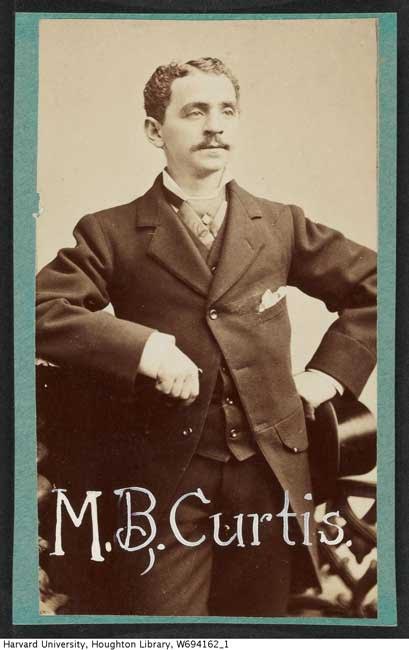
Mauritz spent much of his younger years running away from home, but he was always brought back. Finally at the age of 17, and with the dramatic flair from his father, he made it to Chicago to try his hand at theater. He would become a bit player but soon his luck would change.
He would change his name to M.B. Curtis for a more dramatic flair, and it sounded more American. With his new name he auditioned for a new play called “Sam’l of Posen” that had been written by George H Jessof in 1881. The lead character for this play was a Jewish peddler with a heart of gold. It was supposed to be a comedy, and M.B. Curtis was the man to fill the bill. With the success of just this one play Curtis became a broadway star. He later bought the play and rights for himself and took it all over the country. He was the first Jewish actor to play a Jewish character on stage.
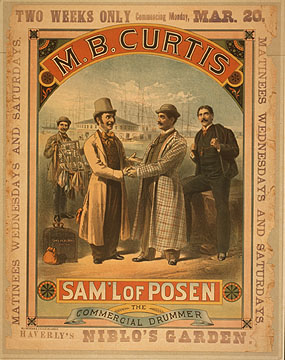
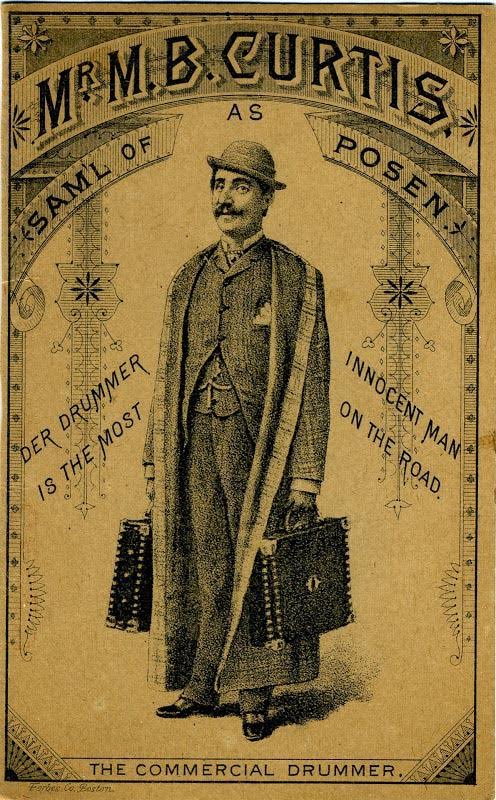
This one play that had made a unknown man a fortune, also help him to acquire a mass of land holdings and businesses in Berkeley California. The movers and shakers of this town knew a good thing when they saw it, and recruited him to volunteer to be President of the Berkley Electric Light Co. He also gave Berkeley a very nice firehouse. On the land that he purchased he built a large castle-like structure that he had hoped to turn into a actors studio. He did finish the structure but his plans never came into existence. He called it Peralta Park. It was used as a hotel for years. Eventually with back taxes mounting for decades the whole property was auctioned off.
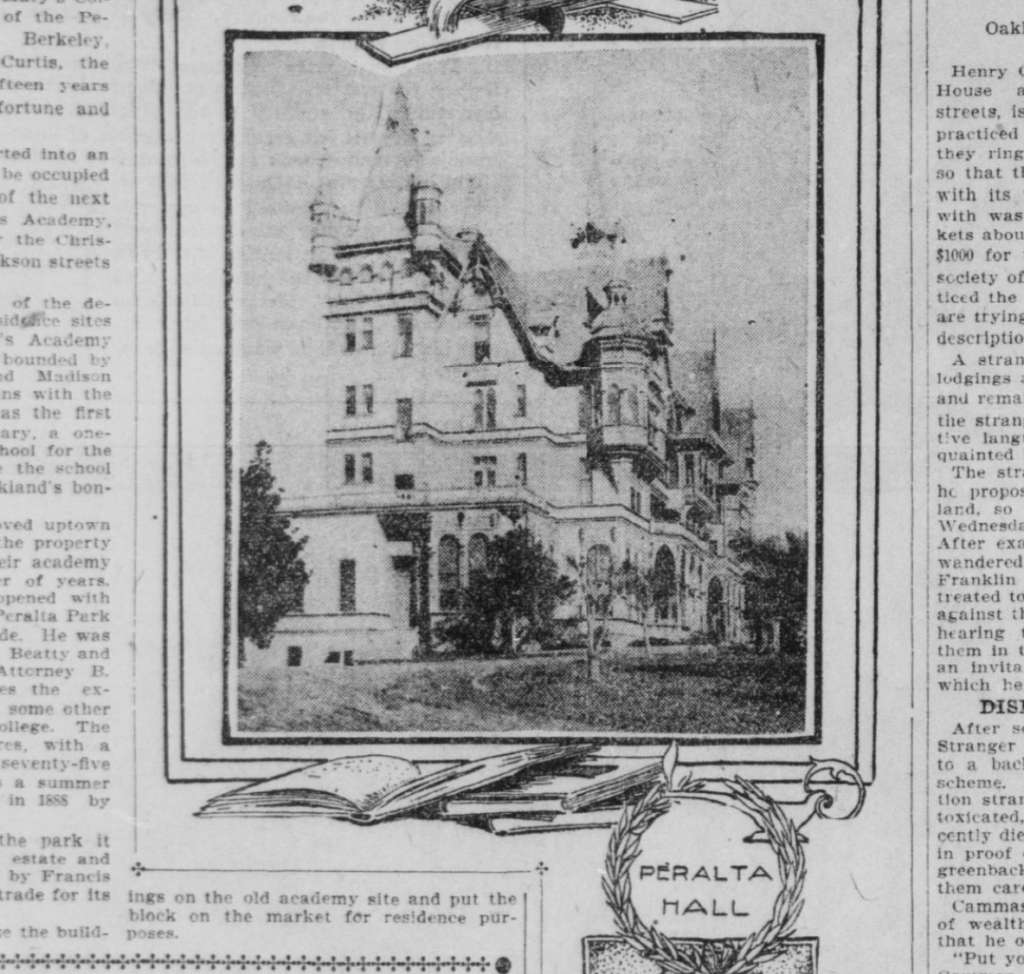
Sunny Days turn to Stormy Nights
Curtis who had been riding high for so long was just a day away from disaster. It was September 10, 1891 and he was in San Francisco now performing his show, and had a night off , so he had heard the great star Sarah Bernhardt was in town also performing her signature role in “Camille.” He decided to take his wife, who had been suffering some medical problems to enjoy a night out. This night would turn the tide of stardom for M.B.Curtis, broadway star, into a nightmare by police arresting him for the murder of an area police officer. Earlier in the evening he and his wife went to the Grand Opera House to see the famed French actress. When 10:00 rolled around, Curtis was getting restless, and left the theater. He strolled over to Tivoli Theater, where he met his friend William Kreling. There they enjoyed a few drinks until about 11:15 when he left to pick up his wife from the theater. He never made it there and the night soon turned south for him.
At 12:25am on September 11, 1891 three shots rang out in the night on Folsom Street, about 120 feet from Mission Street police station. The officers in the station rushed outside to find that a colleague, Officer Alexander Grant laid quiet on the sidewalk, while one man ran away , and another was stumbling around. That man was M.B.Curtis, who they handcuffed, and arrested for this murder.
Curtis’ version of the events earlier in the evening goes like this: He claimed to be heading back to the theater to pick up his wife when from behind he was hit on the head and knocked unconscious. When he came to, a police officer was arresting him, that would have been officer Grant, and another man, apparently his stalker. When the three of them were almost in front of the station the other man pulled out a gun and shot the officer. Curtis ran away fearing for his life. As stated above when other policemen come out of the station all they saw was Curtis running and stumbling around and arrest him. Since he had Officer Grants cuffs on the police know they have the right man. Even with what looks like an open and shut case, there may be more to the story. Many witnesses came forward and the true facts in the case are very murky, but Curtis will stand trial for the murder of Officer Alexander Grant.
The Trial Begins
I will now be writing from actual newspaper articles appearing at the time of the murder. They will be from The Morning Call a newspaper that ran in San Francisco from 1878-1895, and The San Francisco Call 1895-1913. All these papers appear in the Digital Collections of the Library of Congress.
The Morning Call September 15,1891
Actors and Policeman crowded Police Court yesterday when the case of M.B. Curtis for the murder of Officer Grant was called.The accused stepped out of the prisoner’s dock and shook hands with several friends and his legal advisers.
Judge Rix ordered the defendant arraigned and Curtis’s attorney quicky interposed an objection. ” This case was called in Department 2 last Friday and continued until today. At that time we objected to this move and we are here under protest.” { This argument went back and forth for a while and eventually both sides realized that the case would be held in this court.} “Mr Clerk, arraign the defendant.” ordered the judge. Curtis would rise as the complaint was read, “The defendant did malicious and unlawfully and with malice aforethought kill and murder one Alexander Grant.”
“What is your true name?” asked Cook. Curtis’s attorney Kowalsky objected. “We have nothing to say here. I appear for the defendant and I object to all this. I do not mind privately, however that his real name is Maurice Strelinger.”
“Are you ready to proceed with the case?” the judge asked. “We are mute your Honor.” and that was all the defendant’s attorney would have to say for the rest of this proceeding, so the case got a continuance until Wednesday morning, and the accused comedian descended to the gloomy depths of the city prison.
The investigating officers claim to have discovered some new evidence in connection with the killing, but will not disclose its nature until the case is heard in court.
The prisoner is still visited by his wife, and others from the theatrical world. To them he appears cheerful and confident of establishing his innocence, but to reporters he is “mute.”
The Morning Call September 29,1891
Joined in court today are a dozen members of the Police Department, along with Captain Lees, and Detective Ben Bohen. They are here to hear the testamonies of the witness’s to the crime.
The face of the accused comedian was wreathed with smiles as he stepped out from the prisoner’s dock and took a seat beside his wife and attorney’s, George A. Knight, and W.W. Foote. The prisoner looked very natty in a new black suit, with a boutonniere in the lapel of his pocket.
Mrs. Annie Johnson of 846 Folsom Street narrated that about “12:20 am, on the morning of the 11th, she heard loud talking across the street from her house, and raised the window to see what was the matter. She saw two men scuffling, and a stouter man said, “Come, come along now,” then she heard 3 shots fired in rapid succession. The stouter man fell towards the fence and the smaller one ran toward Fifth St. Two officers ran out of the station and one of them stumbled over Grant’s body. When the officers soon returned with a prisoner he appeared to be the same man who ran away after the shooting.” Cross-examined by Foote the witness became “Rattled” and contradicted herself several times. Her statement that she made to Officer Dillon was introduce into evidence.
Mrs. Jennie Holden of 858 Folsom St. related a similar story just like the previous witness. Her Statement she made to officers after the murder, and it was shown to her, and she said it had been changed since it had left her hands. It said now, her having seen the smaller man {Curtis} point something toward the stouter man’s {Grant} head. She said it had been inserted afterwoods.
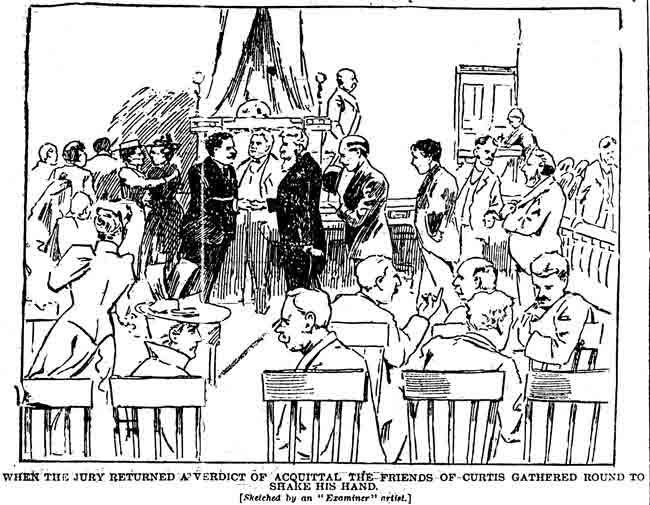
After weeks of testimony, which proved anything but conclusive, the jury finally decided that they could not agree on a verdict, and settled in a hung jury, and his acquittal. He would have to endure another trial when a prop person from his theater came forward and stated that he had seen the gun used in the murder drop from the actors coat two days prior to the murder. Curtis swears he never has owned any gun, and again he gets an acquittal. They will never solve Officer Grants’ Murder. Not even with this new evidence that the court thought would prove his guilt.
Again though he must endure one more trial that he may never get away from.
The San Francisco Call March 13, 1895
Senator William J. Dunn and Frank McManus, the “King” were arrested on October 20, 1893 on a charge of bribery. They were jointly accused of demanding money from Mrs. Marie Curtis, wife of M.B.Curtis, the actor, then on trial for the murder of Policeman Alexander Grant, and their purpose as charged was to bribe jurymen in the case.
Attorney J.N.E. Wilson charged that Dunn and his partner, McManus, demanded $8000 from Mrs. Curtis with which to bribe the jury, and instead of cash, which she did not have at the time, demanded ten lots in Peralta Park, Berkeley, which Curtis owned. Remember this was the pipe dream of Curtis.
The story goes that while Curtis was in jail, Dunn and McManus visited him, and offered to influence four votes from the jury for $8000. Curtis declined the offer, and the next day they saw one of Curtis’s attorneys, Wilson where the same offer was made, they were turned down. Four jurors were to be bribed for $2000 each. After Curtis was acquitted his wife stated that Dunn and McManus forced their way into her rooms at the Occidental Hotel and demanded $8000 for the jurors that had been bribed. They used threats, that terrified the woman, so she agreed to give them ten lots in Berkeley the next day in Wilson’s office. When they arrived at his office the next day Wilson informed them that he would call in Harry Morse or another of his detectives, having the effect of driving the men away.
Shortly after, they made a trip to Fresno California, where Curtis was living on his ranch under the protection of the Deputy Sheriff, as he had been informed from his wife, that these men could have him badly “licked” for $50 and killed for $1000. The men did show up there but never saw Curtis. Dunn and his friend “King” McManus admitted to going to Fresno, but added that it was ” Just for a change of air.”They pretended not to know anything about the charges Attorney Wilson and Mrs. Curtis made about them. Since it was a case of he said ,she said the two were never convicted.
Thru all three trials there were allegations that money was exchanging hands to help Curtis out. He had many very influential friends, but in the end, did Curtis kill Grant? I’m afraid we will never be sure, but one thing I know for sure, M.B.Curtis never performed again, used up all his money on the trials, and died a pauper.
The young man who came to America looking for a brighter future found it and lost it.
